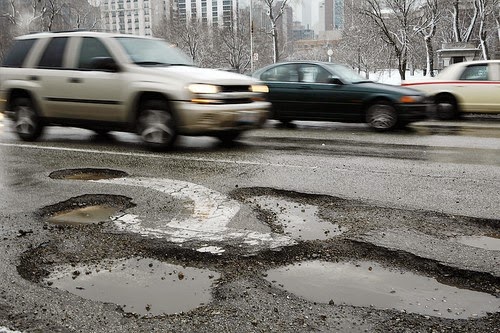Dennis Lennox, a political activist and columnist and bit
of a world traveler, writes this week that he has driven on roads in Ukraine,
Egypt, Romania, Mexico, Lebanon and even on
islands in the middle of the North Sea that are in better shape than Michigan’s
roads.
But Lennox, in his column for The (Mount Pleasant)
Morning Sun, argues that Proposal 1 is worse than no solution for our state’s
road funding shortfall. He’s calling for a close look at alternatives that
would mitigate some of the $1.2 billion increase in funding that the
transportation department says is necessary:
“‘No’ on Proposal 1 is the only answer until those in the
halls of
state government get serious about fundamentally reforming all things
infrastructure by taking up toll roads, highway rest area
privatization, local revenue options and eliminating the archaic
structure of governing infrastructure that only wastes taxpayer money.”
One large-scale Plan B proposed by a Macomb County
lawmaker, state Rep. Pete Lucido, is running out of gas now that the
Legislature is fixated on no-fault auto insurance reform.
Lucido, a Shelby Township Republican, called for funding
road improvements by tapping the interest accumulating in the state’s $18
billion Catastrophic Claims fund. But the idea of siphoning money for severely
injured auto accident victims to fix potholes was criticized as gimmicky and
short-sighted.
In any event, the insurance legislation making its way
through the Capitol would essentially put an end to the Catastrophic Claims
account, except for current benefit recipients.
Ballenger said in a Q&A that the likely defeat of the Proposal 1 sales tax
hike on Tuesday will lead to one of two possibilities in Lansing. The
Legislature could come up with some type of Grand Bargain, much like the
Proposal A education finance overhaul of 1994, or it could do what the
Legislature has been doing for the past 20 years on the nagging roads issue.
margins, trying to cobble together some modest transportation funding increases
that will fall well short of the $1.2 billion annually for a decade that Snyder
originally argued was the only way Michigan’s roads and bridges could be fixed.”






